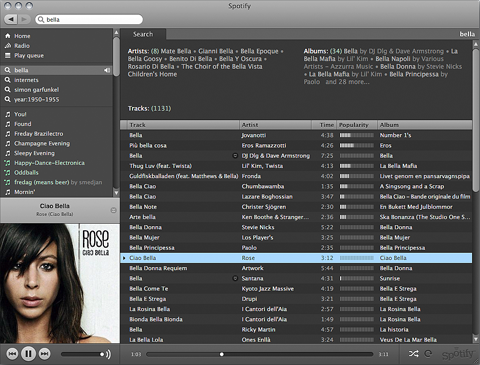This article is more than 1 year old
The Great Spotify Mystery
Part One: Who's really running this show?
"Pre-revenue"
We were treated to two sessions with Ek, which were packed to the rafters - one dangerously so. People from all parts of the music business came to see what Spotify's revenue plan looked like. In the first session - 15 minutes with Brindley - Ek made all the right noises. In the second - an excruciatingly dull hour - we caught a glimpse of what Daniel was hiding up his sleeve. It was his arm.
We'll go into some numbers in a just a moment, but any hopes that Spotify has a masterplan for turning users into cash were dashed. If you hauled a beginner off the street and passed them a crib sheet, culled from every desperate "future of music" conference panel held in the past ten years, it might well match Daniel's list of ideas. First, make a premium version attractive with exclusives. Er... set up a mobile / offline version. Add a bit of social networking cruft. And, er... make Spotify a marketing platform for tickets and merchandise. Oh. And sell all your user info back to the record companies. That's it, really.
But first a few interesting details of Spotify users.
Most are 30 to 50, and are using it for rediscovering music. This age group cares less about discovering new music and ownership of a digital recording - which should please the backers. But it's not a good sign of a healthy business, long term. It suggests Spotifyers already have a music collection and aren't willing to convert free streams into paid purchases. 35 per cent of playlists, said Ek, were merely albums. So much for the death of the album. It's just reconstituted itself.

A cruft-free Spotify: catch it while you can
Ek said thanks to the GMail-style, word-of-mouth, invite-only tactic - a wheeze which builds the hype and creates artificial scarcity - Spotify had spent just £5,000 on marketing itself since 2006. This produced gasps.
So Spotify won't turn off the tap. It therefore needs to turn us happy leechers who don't pay a penny into premium users, or somehow find money from elsewhere.
Ek's three big come-ons for the paid service were social features, a download service that interoperated with your phone or iPod, and exclusives. He said an iPhone version was in the works, but hoped it wouldn't be blocked by Apple, since Last.fm's iPhone app and others had successfully been approved. Reg feedback indicates that Spotify is well loved precisely because it doesn't have scrobbling or widgets, UI clutter or hard upselling. Say goodbye to all that.
The problem from a business perspective is that Spotify gives us such a satisfying experience for free, there's no reason to upgrade. You can, if you want, now buy DRM-free MP3s of some of Spotify repertoire, that you can keep and transfer, without the fancy integration UI Daniel hinted would be forthcoming. The UI today means double clicking a file in Windows Explorer or the Finder. Is that so difficult? The hard part isn't loading it into iTunes. The hard part is actually getting people to pay the quid for a song they know will be in the same place in Spotify tomorrow.
A phamiliar phormula
Then there's the "money from elsewhere". In my review of Spotify I suggested the best bet was licensing. But the official plan has more than a whiff of Phorm about it.
Ek said Spotify "wants to introduce brands to fans, and use it as a channel for merchandising". There were "endless opportunities" for this, he reckoned, where Spotify could "connect a fan with an artist". These include selling virtual items, or selling T-shirt as a package with images from the history of the artist. It wasn't very inspiring: he acknowledged MySpace did this connection business, but couldn't monetize it.
He was pretty upfront about spreading the data around.
"We want to hand out consumer data we have to give to labels so they can target consumers better and communicate better."
They already have your email address - and perhaps 10 of your friends. Now you can see why the 30 per cent (or higher) stake comes in useful. At least he didn't do a Beacon. Mark Zuckerberg announced the notorious Facebook ad program as the biggest revolution in media in a hundred years - and hauled it back in within weeks. But the plan is the same. It's similarly doomed.
Consumer data is indeed valuable if you're a man with a large budget. At El Reg, we wouldn't pretend otherwise. It's valuable because there's large amounts of money being spent, in a mature market that has a small number of suppliers. Acquiring that data is a small price to pay for a large sale. Similarly, the value of consumer data of Spotify users who won't pay for a premium subscription mirrors their potential contribution to the music economy: which is not very much, if anything at all.
So the major labels are spending millions on something that won't make money and most certainly won't be allowed to succeed. That doesn't make sense: it makes Spotify a historic blunder on the scale of MTV or iTunes.
So what's really going on here? In Part Two, I'll attempt to answer this question. ®
[Pic:tinfoilraccoon via Flickr, some rights reserved]
